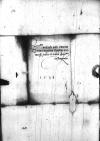Rogarunt me nonnulli amici mei, interponerem partes meas ad Dominationem Vestram Reverendissimam, quo consanguineis sacerdotis cuiusdam in ⌊arce Mariemburgensi⌋ ab intestato non pridem defuncti de pecuniis et rebus illius derelictis Dominatio Vestra Reverendissima conferre aliquid eosque consolatos reddere dignaretur.[1] Quare tametsi sciam res omnes sacerdotum ab intestato morientium ad solius loci ordinarii dispositionem pertinere et neque quempiam consanguineorum iure adire eas aut vendicare sibi posse, quia tamen utique ex eiuscemodi rebus subvenire egentium inopiae ego iustum et pium existimo, rogo Dominationem Vestram Reverendissimam, impartire velit nonnihil praefati sacerdotis defuncti consanguineis inopibus de rebus et pecuniis illius derelictis. Non dubito enim, quin Dominatio Vestra Reverendissima ex illis eisdem rebus cupiat aliquid erogatum iri in egenos. Id, quod ego quoque, quotiens eiusmodi res ab intestato derelictae ad dispositionem meam veniunt, in more meo habeo, eas enim, non secus ac spinas, ipse non attingo et ab usibus meis reiicio, sed pauperum inopiae ex eis subvenio, ubi consanguineos quoque defuncti, quos video inopes aeque atque alios quoque pauperes dignos hac elemosina reputo, et dare eis quoque aliquid iuxta opus pium existimo.
Felicissima sit Dominatio Vestra Reverendissima meque solito amore et benevolentia sua prosequatur.

